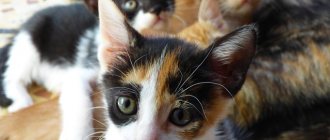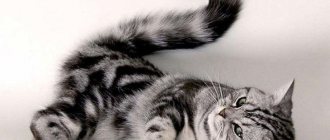Why do cats chew wires?
In your absence, cats are left to their own devices, and if a moment in education is missed, your beloved pet will not refuse to play pranks. Overturned flower vases, holes in curtains from cat claws, broken dishes, scratched furniture. However, all these pranks cannot compare with cats' unsafe habit of chewing wires. To wean a kitten from this unsafe activity, you need to know the reasons for this behavior.
Indeed, many cats show an unhealthy interest in wires. They are attracted to computer, audio, telephone cords, and phone chargers.
This behavior of a pet can be caused by various factors and reasons, including:
- banal curiosity;
- attracting the attention of the owners;
- problems with teeth and gums;
- hypovitaminosis, deficiency of minerals and vitamins in the pet’s body;
- lack of toys, active leisure.
The interest in electrical wires can be explained very simply: cats enjoy playing with ribbons and strings to which a bow is attached, so it is interesting to play with wires. In addition, they are covered with rubber, have a smooth surface, and a dense structure, which is ideal for cat teeth. Don't forget that in nature, hard foods help keep your gums and teeth in order. If the cat receives soft food, is kept on canned soft food, thus he takes care of oral hygiene.
In some cases, pets chew electrical wires out of boredom or lack of toys.
Perhaps your furry pet doesn’t get enough attention from you or the kitten lacks communication and thus wants to attract attention to itself
An unsafe addiction can be caused by a lack of calcium, magnesium, phosphorus, cobalt, molybdenum, and sulfur in the body of animals. The reason may be an unbalanced diet, low-quality ready-made industrial feed, or a diet poor in nutrients.
Causes of addiction
The main reason lies in the curiosity of the cat. The baby learns about the world through smell, taste and touch, trying out all the interesting and new objects by heart. In addition, kittens chew wires because:
- They are teething and hard objects help relieve itchy gums. During this period, kittens chew everything they come across.
- They look like various toys - fishing rods, ribbons, “swings”. Loose wires are a tempting object for playing with them, since cats are attracted to the movement, which awakens in the baby the instinct of the “great hunter” of dangerous snakes or lizards, which thick cables or thin wires from headphones are so similar to.
- The smell of the insulating material attracts cats. Pets like plastic. You can often see a cat licking a plastic bag. Obviously, the material emits some special aroma, inaccessible to the human sense of smell, but attractive to a cat.
An adult animal. Mature mustachioed tabbies can also chew wires when:
The diet does not have enough solid food that can maintain oral hygiene - massage the gums, clean teeth from plaque. Not enough attention. You should observe the behavior of the pet; if it chews and glances slyly at the owner, then in this way he invites to play and demands attention to his own person. The cat understands that the most effective way to attract attention is to do something that is forbidden - scratch furniture, tear wallpaper, chew wires
Even the busiest owner will be distracted and pay attention to the person of the furry robber. Boring. Pets often experience a lack of impressions
If there are no special slides, exercise equipment, or educational toys in the room, then the animal receives positive emotions and new impressions with the help of improvised means. There are not enough vitamins and microelements in the food that the owner gives his pet, and he tries to find what he needs in inedible items. There are mental disorders that cause a perversion of taste and a desire to eat inedible things: sand, pebbles, paper, rags, wires.
The cat, acting for his own understandable reasons, will perceive the punishment as an insult and will take revenge, losing trust in the owner and contact with him.
- change of baby teeth in kittens;
- proper nutrition for cats;
- proper cat training.
How to wean kittens from playing with wires
The appearance of a kitten in the house is a pleasant and exciting event. The little creature actively begins to explore the world, constantly runs around, plays with everything it sees. To protect him from possible threats and keep his home intact, you can immediately prevent his interest in cables:
insulate hanging wires; hide various chargers and headphones from view; remove cables lying on the floor; purchase special toys for the kitten; devote enough time to your pet; choose a balanced food so that the kitten does not experience a deficiency of minerals and trace elements; monitor the condition of the animal’s oral cavity, give the kitten food that needs to be actively chewed; Place colorful cocktail straws near the cables - they will perfectly distract your pet's attention
Kittens play with wires much more often than adults
The most important recommendation is to be patient. When a kitten appears in a family, the owners do not immediately recognize all its habits. You shouldn’t create a negative reaction in your pet by shouting and punishing, because he doesn’t even understand what exactly he’s doing wrong. To curb your kitten's interest in cables, you can give him special food that will stimulate his gums and make teething easier.
Behavior adjustment
In order to wean your pet once and for all from the dangerous habit of chewing wires, as already noted, you need to eliminate the cause.
This approach will only embitter the animal and the cat may begin to do everything to spite you. Show consistency in actions and persistence. Be patient. Cats are smart, quick-witted, but rather capricious and stubborn animals.
You need to teach your kitten good behavior from an early age. You can begin parenting when the baby is completely accustomed to the environment and the members of his family. From an early age, an animal must clearly understand what is allowed and what is prohibited. Adult cats are more difficult to train and it is almost impossible to eradicate some “bad” habits.
Method No. 1 If a kitten or adult pet shows interest in the wires, plays and chews on them, you need to immediately stop this behavior. At the same time, the simplest and most effective method that will wean a cat from gnawing wires is to remove them from the animal’s reach and visibility. For the safety of your furry pet, and also if you just got a kitten and don’t know its habits and manners, hide them in places inaccessible to pets or, best of all, place them in special cable channels (corrugated tubes, boxes).
If the electrical cord hangs from the table, it will attract your pet's attention. Insulate the wires behind the furniture, secure them tightly to the walls and floor. In this case, they will become unattractive to play
Several wires can be fastened together with special clamps. Thick “bundles” of cables are less attractive to cats than individual cables hanging down separately.
In this case, they will become unattractive for the game. Several wires can be fastened together with special clamps. Thick “bundles” of cables are less attractive to cats than individual cables.
Method No. 2 When charging your phone or other electronic devices, place them on elevated surfaces or in places that are difficult for your cat to reach. Stores sell special devices in which the telephone is placed and the entire structure is connected to the outlet.
Do not leave devices charging overnight as cats may become active at night. After charging, hide the devices in places inaccessible to the animal (cabinets, bedside tables).
Be sure to block any gaps between the floor and the bottom or the wall and the back of electrical equipment and household appliances. Don't forget that cats can easily get into small holes.
Method No. 3 The following simple and effective methods and available means will help you stop a kitten from gnawing on wires, including:
- repellent odors, special repellents;
- diet adjustments;
- "Antigrisin";
- aloe juice;
- foil, double-sided tape;
- severe reprimand, harsh sounds.
Method No. 4 As soon as the pet shows interest in the wires, use a stern tone and clap your hands to scare the cat away from the object that interests him. Spray your cat with water or use an empty can of compressed air. Cats are afraid of loud, sharp, hissing sounds, pops, and rustling objects. Movements and repellent actions should be unexpected for the cat.
Method No. 5 Lubricate the entire surface of the electrical cables with something tasteless, for example, mustard, onion, garlic gruel, lemon juice, essential oils with a strong pungent odor that will scare away the little playful.
Many cat breeders recommend treating wires with aloe juice. The bitter taste of the medicinal plant will not harm the cat, but will provoke profuse drooling. Therefore, after the “lesson” taught, you need to pour boiled water into your pet’s mouth. Despite the inhumane nature of the method, it is very effective and the cat will forget for a long time what it is like to chew wires. Also, many felines do not like the smell of citrus fruits. If you don't have aloe, you can use orange peel.
Method No. 6 Buy “Antigrisin” at veterinary pharmacies and pet stores. Lubricate the wires with it. Wrap the cables with foil and double-sided tape. Cats simply hate sticky things.
Wire insulation methods
Get ready for the fact that cats are very stubborn and are able to reach the cable in the most impossible ways.
The simplest and most effective means of protecting cables is their insulation. It helps protect the integrity of the cable and reduces risks to the animal's health.
Table 1. Wire insulation methods
Method Implementations and Notes
Cleaning
All unused wires must be removed out of reach of the animal. Chargers can be hidden in a closet, in a table or on a high shelf. And those cables that are used less than a few times a week can be put away in a special box
Tubes
The most convenient way is to hide constantly used wires in special tubes. Cats also show interest in cables because they are small in size and therefore easy to chew on. Tubes for wires are sold at building supply stores. They are large enough that cats cannot damage them, making them great for protection.
Ties
Ordinary construction ties can also help insulate cables. When the diameter of the wire increases, the purr becomes uninterested in playing with it, and it becomes more difficult to chew on it. Therefore, this method also helps to protect the cables and put them in a certain order.
Fastening to furniture
Those wires that cannot be removed and hidden are recommended to be secured to the furniture as much as possible so that they do not dangle. To do this, you can use a construction stapler or special fasteners.
Skirting boards
An excellent way to insulate is baseboards. Modern models have special sections for wires. If there are no such compartments, you can disconnect the baseboard and lay the cable under it. This method will not only protect the pet, but also preserve the aesthetics of the room.
Treatment with special substances
There are a number of substances whose smell repels cats
But here it is important to maintain a golden mean - not to choose scents that will make the owners feel unwell and at the same time periodically refresh the treatment
Double sided tape
Cats really do not like sticky substances and surfaces, and therefore one of the insulation methods can be called double-sided tape. Your pet is guaranteed not to play with the sticky cable
But this method has its drawback - dust and pet hair will constantly collect on the sticky surface, and therefore the wire will quickly look untidy
Foil
Despite the fact that foil can rustle interestingly and shines quite brightly, cats do not like to play with it. The reason for this is the alkaline taste that appears when you chew it. Therefore, this method can also be used as protection for cables. But there is a possibility that the animal's interest will be renewed after the foil is removed
Help your kitten
A kitten needs proper care, because in essence it is a small child. At about the 3rd week of life, they begin to cut their teeth, and this process ends only in the fourth month. Proper care includes the use of special chewable foods. The special consistency of the food massages the gums, relieving the animal of itching.
From time to time you should look into your pet's mouth. Growing teeth can cause inflammation of the gums and the kitten will suffer. In such cases, it is necessary to immediately contact a veterinarian.
It is important to understand that the kitten chews wires for a reason. Perhaps he spends too much time alone and lacks attention
Sometimes games and affection help to wean animals from bad habits.
Prevention.
Create conditions for your cat to play, this will prevent the desire to chew household items. Sometimes owners report that having a second cat in the house helps their pets not get bored while no one is home.
Regular visits to the veterinarian can prevent the development of dental and digestive problems. Protecting the area from parasites - fleas, ticks - will help to avoid infecting your cat with them. Accordingly, she will not bite herself, damaging the skin.
Cats that are overly skittish and that lick themselves until their skin becomes sore may need sedative medication. They are prescribed by a veterinarian after medical reasons have been ruled out.
What to do if your cat gets electrocuted?
When a cat chews wires, it can even lead to death. For this reason, first of all, you need to ensure that wires and cables are always insulated in places where cats play. Do not leave unattended wires or sockets that are not insulated.
If your pet does receive an electric shock, a number of measures must be taken immediately.
- There is no need to immediately pick it up with your bare hands, as the current can also strike a person. Be sure to wear rubber gloves.
- If the cat is lying motionless, then you should not move it.
- There is also no need to panic, since sometimes it is thanks to a person’s quick reaction that a pet’s life can be saved.
- Unlike dogs, cats can withstand a small shock of electricity.
In case of defeat, some actions must be taken.
- First of all, you need to pull out the damaged cord from the outlet. Be sure to wear rubber gloves when doing this.
- Immediately after this, you need to push the cord away with a wooden object - you can use a mop or a long stick.
- If the animal does not react to anything, you must immediately lift the cat by its hind legs, lowering its head down. After this, you should spin around the axis, which can help bring blood to the brain. If the attempt is unsuccessful, you must try again.
- If no movement is noticed within 12-16 seconds, you can try to give the cat artificial respiration.
- You should definitely keep an eye on the time: you need to know how many minutes have passed since the cat was electrocuted. You should not allow more than 2.5-3 minutes to pass. In this case, it will be difficult to save the creature.
- After the animal has been resuscitated, it is imperative to show it to a veterinarian, since only a doctor can provide proper assistance to the victim.
If you have such a lively pet as a cat in the house, it is best to take care of the wires in advance so as not to risk either expensive equipment or the pet. Wires should be placed in inaccessible places or simply placed in special devices.
Another effective way to stop a cat from chewing wires is presented in the video below.
We stop chewing wires
As soon as you discover bitten wires, you must immediately take any measures.
How to stop chewing wires
We use improvised means
The smells of the following products are good at repelling cats:
- Orange peels.
- Cinnamon.
- Vinegar.
- Ammonia solution (ammonia).
- Aloe juice.
Take dry wipes and moisten them with a weak vinegar solution. After this, they can be placed next to the wiring that your cat has his eye on. A sharp specific smell will scare him away, and therefore he will not even come close.
Orange and Cat
Sound repeller
Many pets are afraid of loud noises, so you can place a rattle or other toy near the wiring. You can put it down and then tie a thread to it. When the cat approaches the wires, it will most likely snag the thread and the rattle will fall. She will immediately run away from such loud sounds.
You can also find special devices on sale that have built-in motion sensors. And if your pet passes nearby, the device will emit a loud beep.
Sprays
In stores that sell everything for pets you can find repellent sprays. For example, Antigryzin is very popular. It contains many citrus essential oils. The spray can be used not only to protect wires, it can also be sprayed in places that your pet likes to mark or scratch with its claws.
Wire insulation
Corrugated pipes and cable ducts can be used for insulation. Some owners wrap the cables with food foil, after a while it can be removed. Cats don't like foil because it leaves an alkaline taste in their mouth after biting it. You can use this trick, and in this way you can stop your cat from chewing wires.
Chewed the wire
Placing wires out of the pet's reach
You can place wires between the wall and furniture, creating a kind of barrier for your pet.
This could be a desk, sofa, closet or chest of drawers. Most often, cats are attracted to loosely hanging wires fluttering in the air, so it is better to combine several wires into one using special clamps. And if there is only one wire, then it can be hidden under the baseboards and run along the wall at a height of 1.5–2 meters above the floor, where the pet cannot reach it. Some craftsmen use special fasteners or a stapler to attach wires to the table top or table legs. You can also use regular tape.
How to stop a cat from scratching and biting?
A cat claws or bites its owner for three reasons:
- she perceives a person as a big toy;
- she is afraid (loss of trust);
- she is in pain (diseases of the liver, genitourinary system, as well as such a very common disease now as opisthorchiasis in cats, etc.).
In the latter case, only a veterinarian will help. In the first two situations, the owner is to blame.
While the kitten is small, people play with it with their hands, playfully “kick” its legs with their toes, allow it to climb up its trouser leg, and when the kitten grows impressive claws, the owners begin to rack their brains over the problem of how to stop the cat from scratching. But the cat is already accustomed to the fact that playing with human legs and arms is fun. She perceives a person as prey. In this case, it is necessary to once and for all prohibit everyone who comes into contact with the pet from teasing the cat with their hands or feet. As soon as the cat targets your hand, distract it with a toy. If the cat still grabs your hand, carefully release your hand and leave the room.
The cat must understand that now they don’t play with it with their hands, it’s no longer fun, but quite the opposite - once the claws are out, the owners’ attention is lost
There is a similar situation with mistrust: the owner forces the cat to endure manipulations that are unpleasant for it, wraps it in a blanket to give it a pill, roughly grabs it to cut its claws or measure its temperature. And when a cat suddenly stops tolerating “bullying,” a person is forced to rack his brains over the task of how to stop a cat from biting. To regain your cat's trust, never force her to do anything. It can take hours to calmly persuade a cat to let you take its temperature. But gradually the time will decrease, and in the end this manipulation will take only a few minutes - without fighting, without racing around the apartment and without scratched hands.
Important: semi-feral cats and kittens picked up on the street rarely fully trust a person. It is sometimes impossible to wean such a cat from biting and scratching, because
these animals are only partially domesticated.
Several ways to fix the problem
Before you decide what to do if your cat is chewing on wires, you need to determine the exact reason for this behavior. We have listed all the possible factors that provoke a kitten to such actions. Now let's look at several effective ways to wean your pet from such dangerous and thoughtless games with wires.
Shorten or hide the wires
The best solution is to remove wires and cables from free access. If there is no possibility of moving it to a hidden place, use special accessories to “hide” the wires from tailed family members.
Specialized stores sell various boxes and corrugated tubes that allow you to protect your living space from the rash actions of children and animals.
We use sprays
Veterinary pharmacies and pet stores sell special sprays that have a special smell that repels cats. These compounds can be used to treat not only wires, but also other places where a small predator likes to “spoil.”
Anti-rodent sprays do not have a pungent odor that is unpleasant to humans. As a rule, the main aroma of such products is citrus. Cats cannot stand the smell of lemons and oranges, so if a special spray is not available, you can use fresh juice or the peel of these fruits.
Loud sounds
Don't know how to stop a kitten from chewing wires? Try raising a little mischief maker using a loud tone for the “no” command. Teach the rules of the ban from an early age, which will allow you to raise an obedient cat with good manners.
To quickly scare the kitten away from the wires, you can use loud sounds, for example, clapping your hands. Experts also suggest using balloons.
If you hang it on a cable that is especially attractive to the animal, you can quickly wean the kitten from playing with a dangerous cord. During the game, the ball may explode, which will scare the little mischief-maker. As a rule, attempts to get closer to an interesting product after such an incident are not repeated.
We use improvised means
The cat chews wires for the first time, what should I do? We use everything we have at hand to scare away! For example, a baby rattle or a bell for a sound effect.
Water distracts cats' attention very quickly. You can direct a stream of refreshing liquid at the playful prankster using a spray bottle or a children's water pistol
But, be careful not to allow water to come into contact with electrical wires and sockets!
What to do if your cat chews on wires in your absence? In this case, you need to treat the surface of the cable using a spray or improvised means. A good repelling effect is observed when lubricating the wires with cinnamon, citrus fruits, ammonia, vinegar or cologne.
Any of the above methods will help solve the problem quickly. To choose the right weaning method, try to find out the main reason why your cat chews wires.
And, most importantly, never use physical force in raising your tailed friend, even if he often breaks the rules of behavior in your home!
Methods for adult cats
In order to wean an adult cat from chewing wires, you can resort to the following simple and at the same time effective methods:
Hide all cables within the animal's field of vision. Exposure to odor. Cats have a sensitive sense of smell, and some scents are repellent to them. The wires can be smeared with lavender or citrus oil. It doesn’t matter if you don’t have any essential oils at home - you need to scatter orange or lemon peels next to the cable, this will give the same effect. The use of specialized protective equipment - animal repellent sprays, for example, Anti-Gryzin. They are sold in pet stores. Impact of taste. Cats don't like bitterness. Therefore, you can discourage the animal from the wires by coating them, for example, with aloe juice. Exposure to sound. Cats quickly develop reflexes. In order to discourage your pet from chewing wires, you can scare him every time by creating a sharp sound. This could be clapping your hands, hitting the table, or loudly pronouncing your pet's name.
Cats cannot stand noise, so gradually the process of gnawing will become associated with an unpleasant bang, and the desire to commit this act again will pass. It is important to monitor your cat’s diet and avoid vitamin deficiencies. Sometimes it is useful to pamper your pet with special treats with a high content of substances necessary for health. Prevent the occurrence of oral diseases
To do this, in addition to brushing your teeth, you can use specialized devices to get rid of plaque and massage the gums - sticks or chewing tablets. Provide the animal with entertaining toys. Regular communication with your pet will help him not to feel left out. This prevents the person's attention from being forcefully attracted.
How to wean yourself from a bad habit
The cat needs to be weaned as quickly and delicately as possible from a bad and dangerous habit. You need to act in accordance with the reason for the formation of addiction:
Purchase premium food that is balanced in nutrients and has the appropriate consistency. Pieces of a certain density and size will satisfy the need for cleaning teeth, help relieve itching and pain during teething, and compensate for the lack of components: taurine, vitamins and iron
A consultant at a pet store or a veterinarian can advise on the best food. Buy special treats at the pet store - sticks made of dried meat, veins to massage the gums and strengthen the teeth. You can buy special vitamins, for example, made in the shape of mice from Gimpet “Topinis”. This is both an excellent addition to the diet and interesting toys that will distract the kitten from the wires, switching attention to satisfying the most important instinct - the hunting one. Make the wires unsuitable for “eating”. To do this, they affect several sense organs at once. It should be treated with a product whose smell cats do not like - Anti-Gryzin spray, essential oil with the smell of citrus fruits, conifers, rub with onion or garlic juice
You can braid the wiring with double-sided tape - cats really don’t like the sticky surface. Needlewomen can knit a cover for the wires from woolen threads, which will prick and irritate the cat’s nose and mouth, so the pet will stop encroaching on their integrity. You can also rub the wires with something bitter. The bitter taste is unpleasant for cats, so they will stop chewing wires smeared with pepper, mustard, aloe juice or Levomekol solution. You should be careful when using these products, since the cat can get a burn to the mucous membrane if there is a high concentration of irritants. Hide the wires in a special box, cable duct, corrugated tube sleeve, or raise them to a height of 0.5 m above the floor. Scare away with sharp loud sounds, using rattles, rattles tied near wires, or using a jet of compressed air from a can to clean the computer from dust. The “forced shower” method, popular with some cat owners, from a spray bottle is not applicable here - water that gets on a damaged wire can cause a short circuit. Give more attention and time to your pet - play with it, talk to it, caress it. Tactile contact not only strengthens the relationship between the pet and its owner, but also calms the nervous system and promotes the production of happiness hormones. Diversify your pet's leisure time so that he doesn't get bored - equip the room with special ladders, shelves and other exercise equipment, buy more toys. It is recommended to consult with a pet store consultant which ones are the most popular. Try 1-2, if the kitten doesn’t like them, then you should buy others. Sometimes a completely unexpected object becomes a kitten's favorite.
If all of the above weaning methods turned out to be ineffective, then you should show the purr to a veterinarian. It is possible that the cause of persistence is a pathology - physical or mental, which requires proper treatment.
Also watch the video on how to stop a cat from chewing wires:
Fighting a bad habit
Many years of experience in friendship between humans and tailed animals have developed effective ways to overcome the problem. The easiest and simplest, and also the most effective way to wean an animal from chewing wires is to hide them in an inaccessible place, thus depriving the cat of access to them at all. If you are getting a cat, keep this point in mind. Move the wires away from the room or hide them in cable ducts for his safety, while you yourself do not know the disposition and habits of your pet.
When there is nowhere to hide the wires in the house, think about what substance or product you can treat them with so that the kitten does not want to get close to them. You can use lemon, which is used to make preparations that stop cats from chewing cables and wires, tearing up furniture throughout the house with their claws, and marking the space in each room. Citrus or aromatic grapefruit oil is used to treat the surface of objects that attract a cat.
There are cat breeders who treat objects with a clove of garlic, pre-cut, ground pepper or mustard. Do not repeat such steps, not only because a long-lasting unpleasant odor will remain in the apartment, but also because the pet may completely lose its sense of smell due to pepper getting into its nose. After all, for a cat, the loss of smell is equivalent to the loss of vision in a person.
The smell of citrus does not linger on the surface of the wires for long, so you can wrap them with insulating tape or tape. Cats are squeamish about sticky surfaces.
Many cat owners rub the wires with aloe juice. The juice of the plant is very bitter and can cause the animal to drool profusely. Therefore, he definitely needs to rinse his mouth with water. This method is not entirely humane, but it is justified in contrast to the possible death of the pet.
If there is a small kitten in the house, then the wires can be treated with anti-gnaze and give it Greenies treats especially for cats with the taste of fish and chicken. The treat will massage the cat’s teeth, and he will not want to chew on cables and wires after it.
How to avoid the problem
Try to find other ways to stop your cat from chewing on wires. For example, these:
- Buy him a soft toy from the veterinarian that he can fiddle with and chew on.
- Pay more attention to the kitten, play with it more often.
- Buy your pet special vitamins containing taurine and iron. Today there are a large number of vitamins, the intake of which can save cats from bad habits.
- Change your cat's diet in consultation with your veterinarian.
- Check the animal for worms.
Stop your cat from chewing wires from childhood, because later it will be much more difficult to do so.
What not to do
There are a number of taboos in overcoming the problem. An attentive owner should take these into account:
- Do not use cruel methods to combat the animal's habit of chewing wires.
- Do not use chemicals that may harm the kitten's health.
- Do not use a stream of water from a spray bottle or water pistol for weaning.
- Do not harshly punish an animal for chewing wires. Indeed, in each case, our pets, not speaking, try to tell us about their problems. How they do it is another question. But in each specific case you must understand and take appropriate measures.
Have restraint and patience, and everything will be fine. Know that animals love you very much!
Why does a kitten or cat chew wires?
It’s interesting that most of the mustachioed friend’s pranks are not a desire to spoil the mood of his beloved owner. Basically, Skoda is a simple curiosity and desire to play.
Toy shortage
Curiosity is characteristic not only of children, but also of adult representatives of the cat family. Pranksters want to taste, touch surrounding objects, and play with them.
All they need is a candy wrapper they find, a piece of ribbon or a juice straw to have fun for a few hours. That's why mustaches are beginning to be interested in electrical cables that look like ribbons. Multi-colored cords become an alternative to toys or even a ball of thread.
Desire to sharpen teeth
Dental problems accompany furry pets throughout their lives. Interest in electrical cables in growing kittens can be explained by the replacement of milk canines with permanent ones. The natural process is accompanied by slight discomfort - the baby’s gums itch, so there is a natural desire to rub them.
Adults use electrical cables to clean plaque from their teeth. Here the problem arises due to the pet’s improper diet - if the cat eats mostly soft food, then plaque from the teeth is not cleaned naturally. The introduction of dry ingredients will help relieve your pet of discomfort and the desire to chew on everything.
To attract attention
Pets are very attached to their owner and his family members. Some individuals experience real stress during the absence of a loved one. Cats, like little children, want attention.
If a cat lacks communication, it begins to attract its owner in different ways. Sometimes the mustache throws objects from tables or flower pots from windows
Bitten cords from electrical appliances also become an attempt by the cat to attract the attention of the owner, expressing himself in a request to devote time to the furry minx
Lack of vitamins
In their natural habitat, representatives of the cat family have always made up for the lack of elements important for life by eating different types of plants or gnawing on branches and bark. Pets do not always have the opportunity to walk in the fresh air. The only source of vitamins and minerals for them is food.
Pets try to make up for the lack of essential microelements in all possible ways. They chew on houseplants, wooden furniture legs, metal objects and electrical cords. The latter are impregnated with special compounds that emit a characteristic chemical odor. It is these aromas that attract some mustaches with vitamin deficiency.
The main reasons for showing interest in wires
How to stop a dog from chewing everything in the absence of the owner.
If a cat chews an electrical wire, then there is some reason for this behavior. The main ones are described below.
Curiosity
At birth, kittens learn about the world and are attracted to everything that lies, hangs, or moves incorrectly. Cats are playful animals by nature, so there must be special toys in the house that will help avoid cutting wires in the absence of their owners.
Attention deficit
Kittens, like small children, constantly need attention, and in its absence they look for a replacement: they tear wallpaper, scratch furniture, tear curtains, and also begin to bite wires
Thus, the animal simply attracts attention to itself, in dire need of communication
Lack of communication
Scratching teeth
Kittens may begin to chew on wires when they are changing their baby teeth to permanent ones. The gums itch and you want to scratch them. Why not bite the wires if the owner did not worry about this in advance and did not purchase special toys that could be used to scratch the gums.
Adult cats begin to chew the cables, thus cleaning their teeth from the plaque that has formed. This happens because the animal consumes liquid food all the time. Plaque accumulates on the teeth, which must be removed by gnawing on something hard.
Attention! To avoid cable biting in adulthood, it is necessary to alternate liquid meals with dry food to remove plaque.
Lack of useful microelements and vitamins
If an animal lives on the street, then it itself compensates for the lack of vitamins in the body by eating grass and other necessary plants. But things are more complicated with pets. They receive all the necessary vitamins and microelements exclusively from special food, but their lack can provoke gnawing on wires and eating flowerpots, because the animal tries to make up for their deficiency.
Few toys
Most owners, when kittens appear in the house, do not spend money on purchasing special toys, because you can easily and quickly make them yourself, for example, tie a small piece of paper to a rope, or take a ribbon and tie it to something so that the animal can play. As a result, over time, the animal begins to grab wires, which will look like ropes, ribbons, temptingly hanging from tables, windows and other places. To avoid this in the future, you should buy toys specifically designed for cats.











